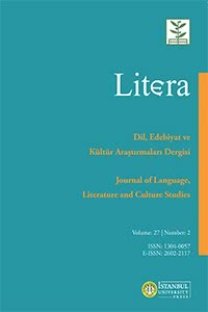İngilizcede Birhan Keskin: Şiir Çevirisine Metafor Odaklı Bir Yaklaşım
Çeviribilimin en çok tartışılan alanlarından biri olan şiir çevirisi kuram ve uygulamaya dönük tartışmalar için birçok zorluk ortaya çıkarmaktadır; ancak aynı zamanda şiir çevirisini konu alan verimli çalışmaların yapılmasının önünü açmaya devam etmektedir. Bu çalışmanın amacı da, şiirin varlığı gereği metaforla yüklü olduğu düşüncesinden hareketle şiir çevirisini farklı bir bakış açısı ve kuramsal arka planla ele almaktır. Bundan dolayı, Andre Lefevere tarafından geliştirilen yeniden yazma kavramıyla birlikte, George Lakoff ve Mark Johnson tarafından metafor kuramı kapsamında kullanılan ontolojik metafor, yapısal metafor, yönelimsel metafor ve kavramsal gösterim kavramlarna dayanan bütünleşik bir inceleme yaklaşımı sunulmaya çalışılmaktadır. Yapılan incelemede, metaphor odaklı bir yeniden yazma eylemi olarak çevirinin, çevirmenden izler taşımakla kalmadığı, aynı zamanda Birhan Keskin’in şiirlerinin, çevirmenin metaforlar bağlamında aldığı kararlar ekseninde erek dil/yazın/kültür dizgesinde yeniden bağlamsallaştırıldığı sonucuna ulaşılmıştır.
English Translations of Birhan Keskin: A Metaphor-Based Approach to Poetry Translation
For several years, poetry translation has been one of the most debated fields of translation studies. It has posed numerous challenges for theoretical and practical discussions, which has paved the way for fruitful and inspiring studies to be conducted in translation studies. This article aims to examine poetry translation from a different point of view and theoretical background, which specifically focuses on the metaphors that poems are traditionally laden with. In doing so, the article attempts to present an integrated approach toward analysis of poetry translation by adopting the four concepts of the metaphor theory proposed by George Lakoff and Mark Johnson—ontological metaphor, structural metaphor, orientational metaphor, and conceptual mapping—along with the concept of rewriting developed by Andre Lefevere. The results of the analysis indicate that translation as an act of metaphor-based rewriting bears the fingerprints of the translator and that the poems of Birhan Keskin have been recontextualized in the target language/literature/culture by the translator’s decisions regarding metaphors.
Keywords:
Rewriting, poetry, translation, metaphor theory Birhan Keskin, George Messo,
___
Alp, R. (2012). Türkçe şiirde “kadın” şairlerinin poetikalarının karşılaştırmalı olarak incelenmesi [Comparative analysis of “woman” poets in Turkish poetry] (Doctoral dissertation, İhsan Doğramacı Bilkent University, Ankara). Retrieved from https://tez.yok.gov.tr/UlusalTezMerkezi/tezSorguSonucYeni.jspBassnett, S. (2002). Translation studies. London, UK/New York, NY: Routledge.
Bassnett, S. (2014). Translation. New York, NY: Routledge.
Bassnett, S. & Lefevere, A. (1998). Constructing cultures: Essays on literary translation topics in translation. Clevedon, UK: Multilingual Matters.
Bengi-Öner, I. (2001). Çeviri kuramlarını düşünürken [Thinking translation theories]. İstanbul, Turkey: Sel Yayıncılık.
Berk, İ. (1978). Çeviride şiir dili [Poetry language in translation]. Türk dili çeviri sorunları özel sayısı [Turkish language journal translation problems special issue], 322, 71-76.
Genette, G. (1997). Paratexts: Thresholds of interpretation (Jane E. Lewin, Trans.). Cambridge, UK: Cambridge University Press.
Harvey, K. (2003). ‘Events’ and ‘horizons’: Reading ideology in the ‘bindings’ of translations. In M. Calzada Pérez (Ed.), Apropos of ideology: Translation studies on ideology – Ideologies in translation studies (pp. 43-70). Manchester, UK: St. Jerome Publishing.
Jakobson, R. (1959/2012). On linguistic aspects of translation. In L. Venuti (Ed.), The translation studies reader (pp. 126-131). New York, NY: Routledge.
Jones, F.R. (2011). Poetry translating as expert action: Processes, priorities and networks. Amsterdam/Philadelphia: John Benjamins.
Keskin, B. (2013). & Silk & Love & Flame [Ve ipek ve aşk ve alev] (G. Messo, Trans.). London, UK: Arc Publications.
Kovala, U. (1996). Translations, paratextual mediation, and ideological closure. Target, 8(1), 119-147. doi:10.1075/target.8.1.07kov
Lakoff, G. & Johnson, M. (2003). Metaphors we live by. Chicago, USA/London, UK: The University of Chicago Press.
Lefevere, A. (1985). Why waste our time on rewrites? The trouble with interpretation and the role of rewriting in an alternative paradigm. In T. Hermans (Ed.), Manipulation of literature studies in literary translation (pp. 215-243), London, UK/Sidney, AU: Croom Helm.
Lefevere, A. (1992). Translating, rewriting, and the manipulation of literary fame. London, UK/New York, NY: Routledge.
Paker, S. (2008). Çeviride ‘yanlış/doğru’ sorunu ve şiir çevirisinin değerlendirilmesi. In M. Rifat (Ed.), Çeviri seçkisi I: Çeviriyi düşünenler [Translation collection I: Translation thinkers] (pp. 121-129). İstanbul, Turkey: Sel Yayıncılık.
Tahir-Gürçağlar, Ş. (2002). What texts don’t tell: The uses of paratexts in translation research. In T. Hermans (Ed.), Crosscultural Transgressions (pp. 44-60). Manchester, UK: St. Jerome Publishing.
Venuti, L. (2008). The translator’s invisibility: A history of translation [2nd ed.]. New York, NY: Routledge.
Watts, R. (2000). Translating culture: Reading the paratexts of Aimé Césaire’s Cahier d’un retour au pays natal. TTR: Traduction, Terminologie, Rédaction, 13(2), 29-46. doi:10.7202/037410ar.
- Yayın Aralığı: Yılda 2 Sayı
- Yayıncı: İstanbul Üniversitesi
Sayıdaki Diğer Makaleler
Selanik’in İspanya Yahudileri (Yerleşme, Yükseliş, Büyük Yıkım)
İngilizcede Birhan Keskin: Şiir Çevirisine Metafor Odaklı Bir Yaklaşım
Pavlos Matesis ve “Dilsizin Kızı” Eserinde Postmodernist Nitelikler, Milliyetçilik ve Öteki
Yunan İlkokul Edebiyat Kitaplarında Türk İmajı
